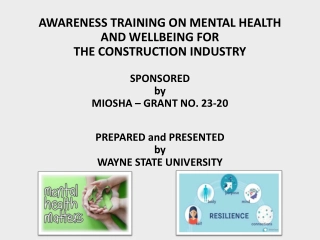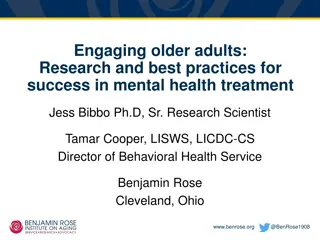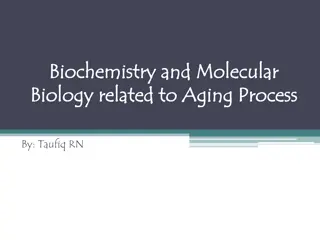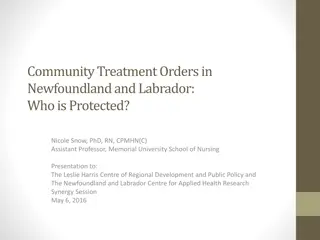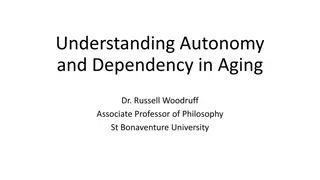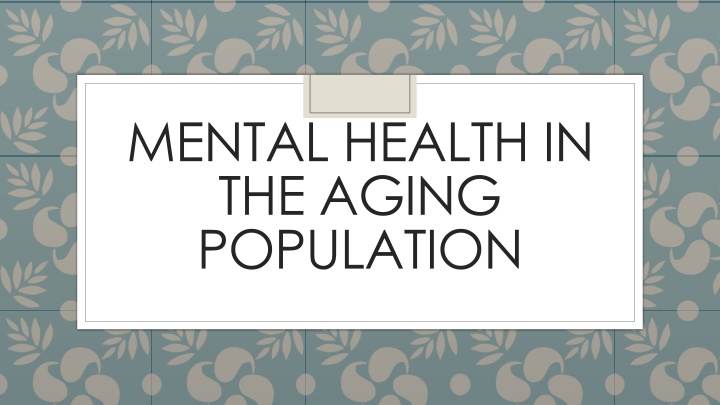
Mental Health Challenges in the Aging Population
Explore the prevalence of mental health issues among older adults, including anxiety and depression. Learn about common symptoms, warning signs, and triggers for anxiety and depression in the elderly population. Discover strategies for identifying, discussing, and managing mental health concerns to promote overall well-being in older individuals.
Download Presentation

Please find below an Image/Link to download the presentation.
The content on the website is provided AS IS for your information and personal use only. It may not be sold, licensed, or shared on other websites without obtaining consent from the author. If you encounter any issues during the download, it is possible that the publisher has removed the file from their server.
You are allowed to download the files provided on this website for personal or commercial use, subject to the condition that they are used lawfully. All files are the property of their respective owners.
The content on the website is provided AS IS for your information and personal use only. It may not be sold, licensed, or shared on other websites without obtaining consent from the author.
E N D
Presentation Transcript
MENTAL HEALTH IN THE AGING POPULATION
Goals Identify symptoms of mental health in older adults by looking for common warning signs. Discuss strategies for talking about mental health issues Look at practical strategies to work towards recovery.
Mental Health in the Elderly 1 in 5 experience MH, SUD or both in the elderly 15 to 20% of the elderly population is impacted Alcohol and medication misuse/abuse is underdiagnosed and undertreated Most Common: dementia or depression anxiety Substance Use Disorder of deaths by self harm are 60 years or older
ANXIETY AND DEPRESSION
Feeling anxious or nervous is a common emotion for people of all ages and a normal reaction to stress, problems and strange situations, and even helps avoid danger. It is normal to feel anxious about illnesses, new social interactions, and frightening events. But when one feels anxious often and the anxiety is overwhelming and affects daily tasks, social life, and relationships, it may be an illness. Anxiety
Symptoms of Anxiety Shakiness and panicky feeling Difficulty breathing, sweating, and nausea Dizziness or feeling lightheaded Digestion problems and chest pain Headaches and confusion Eye and vision problems Muscle tension, soreness, and fatigue Irrational thoughts Forgetfulness Irritability Changes in weight, appetite, or eating habits Inability to sleep Not wanting to leave home, withdrawal, and isolating themselves Obsessive thoughts and compulsive behavior Avoidance of activities, places, people, and even thoughts that trigger anxiousness
Financial insecurity Health problems, immobility, or chronic pain TRIGGERS FOR ANXIETY Dementia Loss of independence and isolation End-of-life planning Grief and loss
An older person may be depressed if, for more than two weeks, he or she has felt sad, down or miserable most of the time or has lost interest or pleasure in most of his or her usual activities. DEPRESSION
Depression Episode period greater than 2 weeks Depressed mood or the loss of interest or pleasure in nearly all activities. Four of the following symptoms must be also be present. changes in appetite or weight, Sleep, psychomotor activity; decreased energy; feelings of worthlessness or guilt; difficulty thinking, concentrating, or making decisions; or recurrent thoughts of death or suicidal ideation or suicide plans or attempts. Depression must be accompanied by clinically significant distress or impairment in social, occupational, or other important areas of functioning. Chronic major depression disorder s (Dysthymia) criteria is two of the symptoms present over a spam of at least two years.
Sadness Somatic complaints (e.g., bodily aches and pains) rather than reporting feelings of sadness. Increased irritability (e.g., persistent anger, a tendency to respond to events with angry outbursts or blaming others, an exaggerated sense of frustration over minor matters). Loss of interest Reduction or increased appetite Psychomotor changes unable to sit still, pulling of skin, slowed speech or thinking, etc. The sense of worthlessness or guilt which may include unrealistic negative evaluations of one s worth. Thoughts of death, suicide ideation, or attempts
Behaviors General slowing down or restlessness Neglect of responsibilities and self-care Withdrawing from family and friends Decline in day-to-day ability to function, being confused, worried and agitated Inability to find pleasure in any activity Difficulty getting motivated in the morning Behaving out of character Denial of depressive feelings as a defence mechanism Thoughts Indecisiveness Loss of self-esteem Persistent suicidal thoughts Negative comments like 'I'm a failure, 'It's my fault' or 'Life is not worth living' Excessive concerns about financial situation Perceived change of status within the family Feelings Moodiness or irritability, which may present as angry or aggressive Sadness, hopelessness or emptiness Overwhelmed Feeling worthless or guilty Physical symptoms Sleeping more or less than usual Feeling tired all the time Slowed movement Memory problems Unexplained headaches, backache, pain or similar complaints Digestive upsets, nausea, changes in bowel habits Agitation, hand wringing, pacing Loss or change of appetite Significant weight loss (or gain)
Seniors and Substance Use Disorders -Alcohol and prescription drug is a fast-growing problem in the elderly -impacts up to 17% of adult over 60 -many medical conditions or behavioral disorders mimic symptoms Triggers include retirement death of family members or spouse, close friends, pets loss of income loss of purpose relocation or placement in nursing home trouble sleeping family conflict mental or physical health decline
Memory problems Changes in sleeping habits Unexplained bruises Irritability, sadness, and depression Unexplained chronic pain Changes in eating habits Wanting to be alone often Failing to bathe or keep clean Losing touch with loved ones Lack of interest in usual activities Signs of Drug Abuse
HOW TO DISCUSS MENTAL HEALTH
How to help Many problems can be prevented with education and information Familiarize yourself with conditions and the impact on the elderly Caregivers should recognize problems and overcoming discomfort in talking about difficult issues that improve health and quality of life Be Respectful Ask open ended questions- questions that elicit more than a yes or no Acknowledge worries and address any fears that can be handled Speak calmly and build on conversations but don t bombard with questions Use reflective listening Involve others, family, friends, support systems, etc. Notice differences and talk about changes Track changes that continue over time, even small ones
How do I say what Use person first language Take harmful and labeling language out of your vocabulary Don t make promises that this will go away or tomorrow will be better Don t make excused for it being a bad day Don t give out advise and expect change Apologize for hurtful things you might say Look at tone and intent Be tactful
Be aware of physical limitations.Encourage an older adult to consult with a physician before making dietary changes or undertaking any new activity that may stress his or her stamina. Respect individual preferences.Because elderly people tend to be less amenable to lifestyle changes, they may be reluctant to adopt new habits or do things that their peers find highly enjoyable. A psychologist who specializes in aging issues can help tailor an individualized strategy to combat depression.
Address worries that can be handled, ie. Seeing a financial planner Engage support systems or create new support systems Encourage more social activities Movement Work on stress management techniques, deep breathing, prayer Exercise Avoid Caffeine, over-eating, over sleeping
Be calm and reassuring Acknowledge their fears but do not play along with them Be supportive without supporting their anxiety Offer assistance in getting them help from a physician or mental health professional Limit current news if it s overwhelming Seek out medication Engage in therapy

